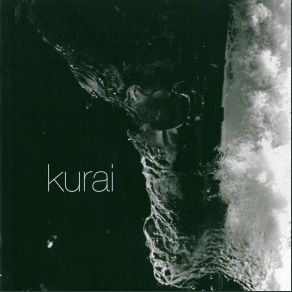Kurai
Download links and information about Kurai by Kurai. This album was released in 2010 and it belongs to Ambient, Electronica, Jazz, Alternative genres. It contains 17 tracks with total duration of 01:11:27 minutes.

|
|
|---|---|
| Artist: | Kurai |
| Release date: | 2010 |
| Genre: | Ambient, Electronica, Jazz, Alternative |
| Tracks: | 17 |
| Duration: | 01:11:27 |
| Buy it NOW at: | |
| Buy on iTunes $9.99 | |
Tracks
[Edit]| No. | Title | Length |
|---|---|---|
| 1. | Herbert Quain | 3:35 |
| 2. | Cavedio | 8:05 |
| 3. | Premessa Inessenziale | 1:14 |
| 4. | Einigermassen Ruhig | 5:22 |
| 5. | Miniature On Rovine | 1:09 |
| 6. | L'Eco Delle Fiamme | 7:34 |
| 7. | L'Oscurità Naturale Delle Cose | 1:11 |
| 8. | Fluster-Kadenz | 6:57 |
| 9. | Strassenleuchte | 0:53 |
| 10. | Treffpunkt | 6:27 |
| 11. | Fuoco Pallido | 5:00 |
| 12. | Peter Was There Too | 5:40 |
| 13. | Lento #1 | 0:35 |
| 14. | Einigermassen Ruhiger | 5:29 |
| 15. | La Folgore Nera | 2:05 |
| 16. | Still Water | 2:24 |
| 17. | White | 7:47 |
Details
[Edit]"Marcello, we know that 'rock' (or actually, 'rOck') is part of the name of your label, but so is 'Art,' and that's what we plan to emphasize with this project." The Yugen members and collaborators comprising most of the musicians heard on Kurai's eponymous 2009 CD probably didn't pull AltrOck label head Marcello Marinone aside and issue such a pronouncement, but it's not hard to imagine this as the conversational gambit that opened the door to Kurai's creation. Perhaps after the thoroughly scored music of Yugen's first two albums, 2006's Labirinto d'Acqua and 2008's Uova Fatali, Francesco Zago (guitar/Mellotron), Maurizio Fasoli (piano), and Giuseppe Olivini (percussion/harpsichord/shruti box) needed to loosen things up. The three Italian Yugenauts joined forces with two Swiss reedmen, bass and contrabass clarinetist Peter Schmid and saxophonist Markus Stauss — both of whom also contributed to Labirinto d'Acqua — as well as Swiss bassist Christian Weber and Italian classical harpist Enrica Di Bastiano, to record this set that emphasizes mood, texture, and atmosphere rather than fire and tumult. Labirinto d'Acqua might be considered — in part — to be a forerunner of the music here: Yugen's debut album had a bit of a split personality, dominated by densely packed avant-prog rock but also featuring brief moody miniatures focusing on individual instrumentalists and small groupings, whether ruminative piano; dark Crimson-ish Mellotron; or a skronky conversation — featuring Schmid and Stauss — that would satisfy most aficionados of probing, reed-based avant-garde improvisational music. Here, those miniatures have grown up and taken over.
Don't be fooled by the opening moments of leadoff track "Herbert Quain," a nearly funky start featuring abrupt jazzy piano chording with wide-interval single-note accents, nimble electric bass from guest Stephan Brunner, and a pair of staccato, chattery reeds (Stauss' soprano sax and guest Marco Sorge's clarinet) in the right and left channels. ("Guests" Brunner and Sorge also appear as Yugen members on Labirinto d'Acqua.) Deep space enters the picture in short order via Zago's Mellotron, and after a short bit of low reed punches with piano and harpsichord, the ghostly Mellotron is overlaid with Di Bastiano's harp pluckings embellished by crystalline treatments and percussion. The piece dissipates into silence and that relatively hoppin' start three and a half minutes earlier seems a deep and mysterious universe away. Awaiting you are mysterious choirs and alien sounds; a few comparatively assertive piano miniatures; low reed and contrabass explorations painting alternatingly sparse and splattery pictures with loose rhythm section backing that gives only a fleeting embrace to jazz; and clattering free improv with babbling reeds, spacy chord and noise washes, and unidentifiable slammings and crunchings (the latter well exemplified by "L'Eco delle Fiamme," nearly an entire avant-garde music festival collapsed into seven and a half minutes). The harp, piano, and those low rumbling reeds are often accompanied by extended tones and drones covering most of the audible spectrum — although there are moments when the piano ("Fuoco Pallido") or reed pops and clicks ("Peter Was There Too") stand alone, and "Einigermassen Ruhiger" is an entirely acoustic improvisation by a jazz sextet lineup. The journey wraps up on slow and even melancholy terrain, the Mellotron simulating cello and flute, backed by harp arpeggios and a beautifully subtle, shifting ambience that falls into imperceptibility before re-emerging in a dreamlike looping coda. Despite its considerable variety, Kurai is ultimately united by its spaciousness and silences — hovering yet not undisturbed — that nearly place time in suspension. It appears that quick-change artists, even musical ones, need to take a breather once in a while — and you may take pleasure in breathing along with them.